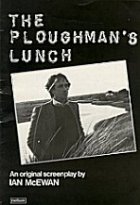
The Ploughman's Lunch Page #9
- R
- Year:
- 1983
- 107 min
- 365 Views
JAMES:
It's okay.
LECTURER:
Right. So by the time the British
and French launched their invasion
at the beginning of November the
main economic reasons for doing so
had largely evaporated. What
remained, especially for the
British, were the more marginal
and emotional arguments.
INT. JAMES'S FLAT - EVENING
The Lecturer's voice continues on the tape. James pours a
drink and he listens and walks towards his desk.
LECTURER (V.O.)
(from tape)
Using the language of private
behaviour you could say that this
was an affair of the heart - the
idea was to teach Nasser a lesson,
to appear capable of acting
independently, and to maintain
face in the world, particularly
the Arab world.
James switches the tape recorder off. He picks up the
Vogue 'Mothers and Daughters' article and pins it to the
map of Egypt.
INT. A COMMUNITY HALL - EVENING
A poetry reading, given by Edward Long, has just come to
and end. There are about fifty present, and empty chairs
behind. Jeremy and James are in the audience.
Edward is reading the last stanza of a poem.
EDWARD:
(reading)
"And so the ferry moves across the
bay, Top heavy as a wedge of wedding
cake, Leaving us to return to our
hotels, Gulls in nautical trim cry
their farewells, Then drop with
avaricious eyes to tale, Souvenirs
from the debris of the day."
He pauses.
EDWARD:
Thank you very much.
There is earnest applause which peters out. Now, a tense
silence.
Edward stares impassively at the audience until he catches
the movement of a half-raised arm.
EDWARD:
Yes.
The questioner is a middle-class middle-aged woman, rather
twittery.
WOMAN:
Me?
EDWARD:
Yes.
WOMAN:
Oh, yes, well I thought I'd start
the thing off by asking, you know,
and you'll probably think it's a
stupid question that you get all
the time, but could you tell us a
little of how you actually get
ideas, I mean, your poems are quiet
extraordinary and beautiful and I
wondered how they, well, you know,
came about.
During this, Jeremy has caught James's eye and they have
started to giggle silently. This continues through the
scene. They hunch up and turn away from each other, shaking
quietly, half recover, become aware of each other, or of
the absurdity of the questions, or of Edward's attempts to
deal with them, and they fold up once more. From Edward's
POV we SEE their heads duck down.
EDWARD:
It isn't a stupid question, but it
is a difficult one to answer. I
get ideas in much the same way as
anyone does. Perhaps the difference
is that I take them more seriously.
I write them down - odd scraps of
things. Then I seem to know when
I'm ready to start work on a poem.
It takes shape to start work on a
poem. It takes shape as I write
it, very slowly.
While Edward answers, the woman nods vigorously.
James and Jeremy recover in the brief pause between
questions. They lift tear-stained faces, then crack up at
the next question.
A young man, anorak, flat auto-didact's 'does the team
think' voice. A piece of paper in hand, he stands,
trembling.
MAN:
You are one of the most praised
poets of your generation of younger
poets, and the Sunday Times has
called you a cross between Dante
and Philip Larkin. What is your
reaction to this?
EDWARD:
Well, it's silly really.
(catching sight of
Jeremy and James)
It's journalism, yes?
A serious-looking student has his hand raised.
STUDENT:
Yes. What is the poet's role in
society today?
CLOSE ON James, drawing breath. A sudden sharp yelp from
Jeremy fighting for air. All heads turn. The two are
almost off their seats onto the floor. We move CLOSE ON
them and hear their moans or 'No', 'No' and 'Stop', 'stop'
and 'Sorry!'
INT. NEWSROOM - LATE MORNING
The newsroom. The teleprinters. The sheets arriving on
the copytaster's desk. On the TV monitor there are pictures
of the Fleet. On the P.A. a voice announces 'Edward Du
Cann on Four'.
Translation
Translate and read this script in other languages:
Select another language:
- - Select -
- 简体中文 (Chinese - Simplified)
- 繁體中文 (Chinese - Traditional)
- Español (Spanish)
- Esperanto (Esperanto)
- 日本語 (Japanese)
- Português (Portuguese)
- Deutsch (German)
- العربية (Arabic)
- Français (French)
- Русский (Russian)
- ಕನ್ನಡ (Kannada)
- 한국어 (Korean)
- עברית (Hebrew)
- Gaeilge (Irish)
- Українська (Ukrainian)
- اردو (Urdu)
- Magyar (Hungarian)
- मानक हिन्दी (Hindi)
- Indonesia (Indonesian)
- Italiano (Italian)
- தமிழ் (Tamil)
- Türkçe (Turkish)
- తెలుగు (Telugu)
- ภาษาไทย (Thai)
- Tiếng Việt (Vietnamese)
- Čeština (Czech)
- Polski (Polish)
- Bahasa Indonesia (Indonesian)
- Românește (Romanian)
- Nederlands (Dutch)
- Ελληνικά (Greek)
- Latinum (Latin)
- Svenska (Swedish)
- Dansk (Danish)
- Suomi (Finnish)
- فارسی (Persian)
- ייִדיש (Yiddish)
- հայերեն (Armenian)
- Norsk (Norwegian)
- English (English)
Citation
Use the citation below to add this screenplay to your bibliography:
Style:MLAChicagoAPA
"The Ploughman's Lunch" Scripts.com. STANDS4 LLC, 2024. Web. 23 Dec. 2024. <https://www.scripts.com/script/the_ploughman's_lunch_500>.



Discuss this script with the community:
Report Comment
We're doing our best to make sure our content is useful, accurate and safe.
If by any chance you spot an inappropriate comment while navigating through our website please use this form to let us know, and we'll take care of it shortly.
Attachment
You need to be logged in to favorite.
Log In